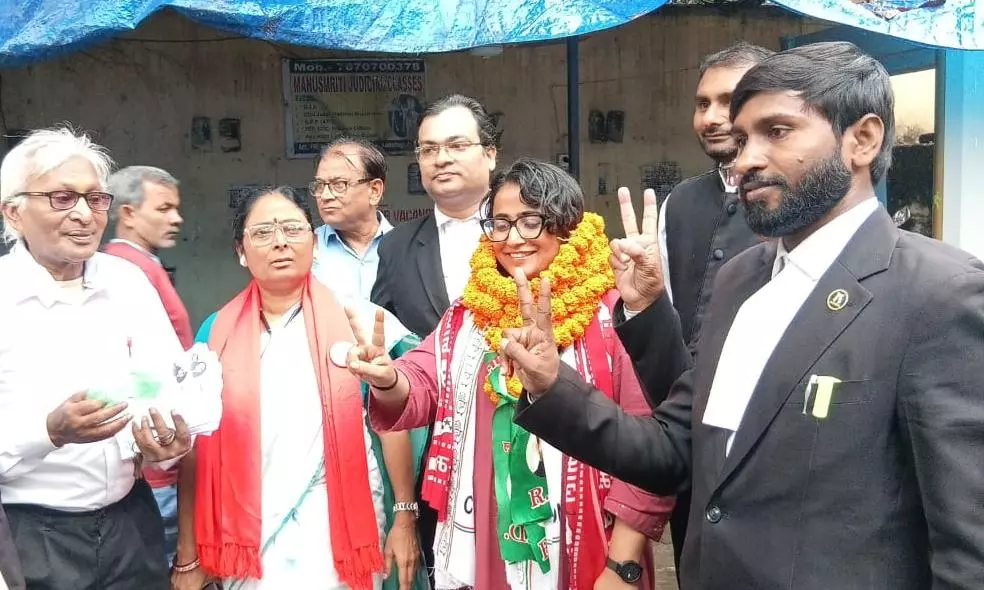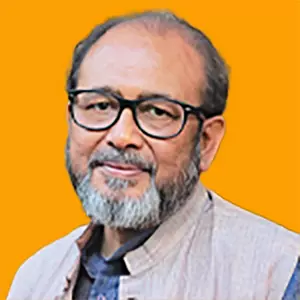
- Home
- India
- World
- Premium
- THE FEDERAL SPECIAL
- Analysis
- States
- Perspective
- Videos
- Sports
- Education
- Entertainment
- Elections
- Features
- Health
- Business
- Series
- In memoriam: Sheikh Mujibur Rahman
- Bishnoi's Men
- NEET TANGLE
- Economy Series
- Earth Day
- Kashmir’s Frozen Turbulence
- India@75
- The legend of Ramjanmabhoomi
- Liberalisation@30
- How to tame a dragon
- Celebrating biodiversity
- Farm Matters
- 50 days of solitude
- Bringing Migrants Home
- Budget 2020
- Jharkhand Votes
- The Federal Investigates
- The Federal Impact
- Vanishing Sand
- Gandhi @ 150
- Andhra Today
- Field report
- Operation Gulmarg
- Pandemic @1 Mn in India
- The Federal Year-End
- The Zero Year
- Science
- Brand studio
- Newsletter
- Elections 2024
- Events
- Home
- IndiaIndia
- World
- Analysis
- StatesStates
- PerspectivePerspective
- VideosVideos
- Sports
- Education
- Entertainment
- ElectionsElections
- Features
- Health
- BusinessBusiness
- Premium
- Loading...
Premium - Events

Divya Gautam, Grand Alliance candidate from Digha, represents a new wave in Bihar politics — challenging dynastic norms, patriarchy, and symbolising hope for change
It is fairly likely that the name, Divya Gautam, would be eclipsed and eventually forgotten once the verdict of the Bihar Assembly Elections is declared.
Yet, over the past few days, stories which appeared in various newspapers — detailing her unconventionalism and socio-political valour — make it evident that she symbolises hope for India.
By pursuing strategies, which Divya Gautam believes will enable her to emerge as an agent of change, she has the potential of being the usherette of the renewed dream of an egalitarian and inclusive nation.
No political connections
The irony is that she may not emerge as an electoral vanquisher, for her party, the outlier Communist Party of India (Marxist–Leninist) Liberation, has pitted her as the Mahagathbandhan candidate, against two-time sitting Bharatiya Janata Party (BJP) MLA, Sanjeev Chaurasia, from Digha, part of the present urban conglomerate of Patna.
Also Read: Is the Grand Alliance losing momentum ahead of Bihar election?
For a party that furthered its electoral hegemony in the country by harping against ‘dynasticism’ within Congress and other adversarial parties, it is a testimony to the BJP’s two-faced trait that Chaurasia is the son of Ganga Prasad, long-time party leader and Governor of Sikkim for a five-year term from 2018 to 2023, when he also simultaneously held temporary gubernatorial charge of Meghalaya and Manipur.
In contrast, barring a late cousin who was a public figure of sorts, Divya has no ‘connections’ in the political terrain. In any case, she would not be looking at a positive electoral outcome as a primary objective.
A woman in patriarchy-steeped India
Within the parameters, in which she would be judged by those who do not look at politics as the continuation of a family ‘tradition’, or a vehicle to wield political and administrative power, she would — because of the life-path eked out so far, and the choices she’s made in her not so long life — emerge as a clear moral winner in these hustings.
Being a woman in patriarchy-steeped India, especially Bihar, is a harsh home truth. She was written about fairly extensively when her candidature was announced and the campaign had not yet picked up momentum.
Also Read: Why NDA fielded only 5 Muslim faces in Bihar elections
Yet, unsurprisingly, most played up the fact that she was the cousin of Sushant Singh Rajput, the cine star with a tragic end.
It is a sad testimony to the fact that in the silver jubilee year of the 21st century, and in the period that has been labelled gloriously as Amrit Kaal by Prime Minister Narendra Modi, a woman’s identity is still not considered ‘complete’ unless she is associated with a well-known male, living or dead.
To be a successful woman, she has to be at least a mother, daughter, wife or sister of an accomplished and successful male.
Also Read: Bihar elections: Over 1,250 file nominations for 1st phase on Nov 6
Despite seeing itself as a mirror of society, the Indian media often lingers in the framework of yore. Among the news reports that emerged while searching stories featuring Divya, the majority mentioned her ‘connection’ with Rajput in the headline, while the remaining few included this bit in the body copy.
Beyond Rajput, who is Divya Gautam?
These papers and websites gave scant thought to the fact that, like hundreds of millions of Indian women, Divya Gautam too has an independent and distinct identity that must not just be known, but needs to be simultaneously recognised as holding the promise for India’s future.
It is not that rebelliousness and being ‘different’ are new to India and Indians. Had that not been the case, the Indian revered as ‘Mahatma’ and many other iconic nationalists, would have been little but lawyers, academics, petty businesspersons and so on.
Also Read: Ground report: Prashant Kishor, a 'stranger' in his ancestral village
India may have continued being a British colony if the aforementioned traits had not come naturally to that generation of Indians who gave their shoulder to the national movement. But its path would have been different, and the people would also have been of a different mettle. How and to what extent the characteristics of the nation would have differed, is open to imagination.
Yet, since 2014, there has been greater societal pressure to be ‘normal’ and not cause discomfort to power. Families have reined in many a potential radical for fear that they would be labelled ‘anti-national’.
A political braveheart
In that context, Divya’s choices frame her as a political braveheart. Someone who did not stop early in her college life, to just watch films during a fest entitled ‘Cinema of Resistance’, but chose to be part of the stream that reflected the ideas in that curated set of films.
In that ever-dwindling space that accounts for stable ‘government’ jobs, she chose not just to stay away from the “bazaar of competitive examinations” but even forsook a teaching assignment and a regular government, both which would have ensured the middle-class dream — ‘stability’.
Divya did not go to college when leftist politics was the ‘in-thing’ in a large number of colleges. She was fortunate that a noted college in Patna, where she secured enrolment, had a section of students at least, who appreciated participation in theatre, political films and politics.
From college union to mainstream politics
Not many individuals dabbling in students' union politics go on to get more rooted in politics. Among those who do so, the majority, especially since 2014, got entrenched in the ruling party of this era.
For others, especially the ones who chose more radical political parties, like Divya did, life becomes tougher with the regime of the moment being very prompt with labelling adversaries as traitors, urban-Naxals and so on.
Also Read: Bihar election 2025: Issues dominate over caste, says Manisha Priyam
Despite not being unaware of these realities, Divya seamlessly ‘graduated’ from being a member (and ‘unsuccessful’ candidate for the students' union president’s post) of the All India Students Association, to that of the parent party, the CPI (ML) Liberation. She is now its candidate from a seat where another ‘comrade’ was vanquished by Chaurasia in 2020 by close to 50,000 votes.
History is replete with instances when people, even women, chose not to follow the beaten track. Divya is not the first who is simultaneously adept in Italian dramatist Dario Fo’s plays, Mannu Bhandari’s Mahabhoj, researching for her PhD on the three travails of Bihar — caste, class and masculinity in the world of Bhojpuri stardom — and jumping into an agitation demanding ordained rights or promised facilities.
Her choice — a ray of hope
Divya will also not be the last to tread the alternative track. But her choice in an era of majoritarian passivity generates hope that torch-bearers of those who ‘make reply’, and ‘reason why’, are still around and unwilling to charge at diktats like the ‘Light Brigade’.
Also Read: JMM pulls out of Bihar polls, alleges ‘political conspiracy’
Undeniably, every nation requires soldiers to protect its frontiers and strike back in a disciplined manner when inimical forces threaten land, people and resources. But every democracy requires checks and balances, too.
That is what the likes of Divya Gautam may provide in the times to come.
(The Federal seeks to present views and opinions from all sides of the spectrum. The information, ideas or opinions in the articles are of the author and do not necessarily reflect the views of The Federal)


